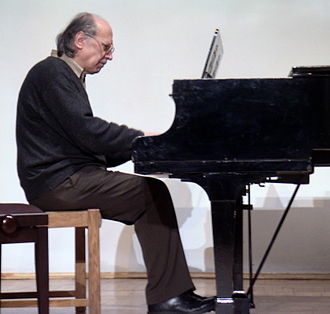by Jarrett Hoffman

A concert by Dana percussionist Brett Weigel, a profile of Ukrainian composer Valentin Silvestrov (pictured), a job opening at CIM, an issue facing the Rock Hall, the official song for the Cleveland Guardians, Garrison Keillor rescheduled, and the confusion, anger, and division surrounding the birthday of Bach.
THURSDAY’S SCHEDULE:
Today’s easy for the datebook. At 7:30 pm at the McDonough Museum of Art, the Dana School of Music presents an honors recital by percussionist Brett Weigel, who will play works by Mitchell Peters, John S. Pratt, Frederic Chopin, and J. S. Bach. The concert is free.
UKRAINE, A JOB OPENING & LOCAL NEWS:
Valentin Silvestrov, 84, is the best-known living composer from Ukraine. And as The New York Times writes, since the start of the war he has not only become a musical spokesman for his country, but also a refugee, having fled from Kyiv to Berlin with his family. Read Peter Schmelz’s profile of Silvestrov, whose “subtle, consoling music has taken on new significance for listeners in a war-torn country.”
The Cleveland Institute of Music is looking for a General Accountant. Check out the Musical America listing here.
Comments by musicians such as Dolly Parton, Dionne Warwick, and Jay-Z provide the background for an article by Troy L. Smith for Cleveland.com which asks, “When the artists being nominated and inducted are questioning their own ‘rock and roll’ credentials, does the Rock & Roll Hall of Fame have a fundamental problem?”
Speaking of rock & roll, the Cleveland Guardians have introduced their official team song: We Are Cleveland. The blues-rock track track was produced by Sam Getz and Jimmy Weaver, members of Cleveland-based band Welshly Arms, and was recorded at Blakwall Studios by a number of musicians from the area. Read the story from Cleveland Scene and listen to the song on YouTube.
Another note on the non-classical side of things: originally slated for earlier this year, the visit from author/musician/radio host Garrison Keillor to The Kent Stage has been rescheduled for July 28 at 8:00 pm. Keillor will be joined by pianist Dan Chouinard and vocalist Prudence Johnson for a program of stand-up, audience song, and poetry. Tickets are available here.
TODAY’S ALMANAC:

Johann Sebastian Bach is a well-known example, born in 1685 on the 21st of March in Old Style (O.S.) — the 31st in New Style (N.S.). So which day should be celebrated? It’s an issue that has polarized Americans, some of whom suggest a middle ground: celebrating both dates.
That compromise is not only weak, but also short-sighted. Put yourself in Bach’s shoes: the situation might be entertaining for a year or two, in an ironic way — think of the funny invitations you could send out, and the quirky messages you could share on your social media platforms. But with time, the meaning behind both days would surely bleed away — as would the number of those in attendance to see you, and the size and enthusiasm of your online following.
So again, which one? In the past I’ve leaned toward O.S. out of sympathy for the person in question: it’s difficult enough to keep vague track of the birthdays of your loved ones, let alone remember a new one for yourself. On the other hand, in a slightly egotistical way we all ascribe meaning to the digits that make up our birth date — for me personally, 11/29 is an absolutely beautiful set of numbers which frankly deserve wider recognition. For that reason, the change to N.S. could be a subtle but satisfying way to bruise the ego of any historical great.
Or maybe this whole discussion is completely irrelevant, because either way, J.S. Bach remains an Aries. (Him, a Taurus — imagine!)
We’ve offered several recommendations of Bach’s music in our almanac over the past two years. As Daniel Hathaway wrote in one Diary entry from 2020:
With some 1,128 surviving works, picking just a few to mark the composer’s passing is an exercise in futility. Two of them bookend his career in fascinating ways.
Read that article here.



